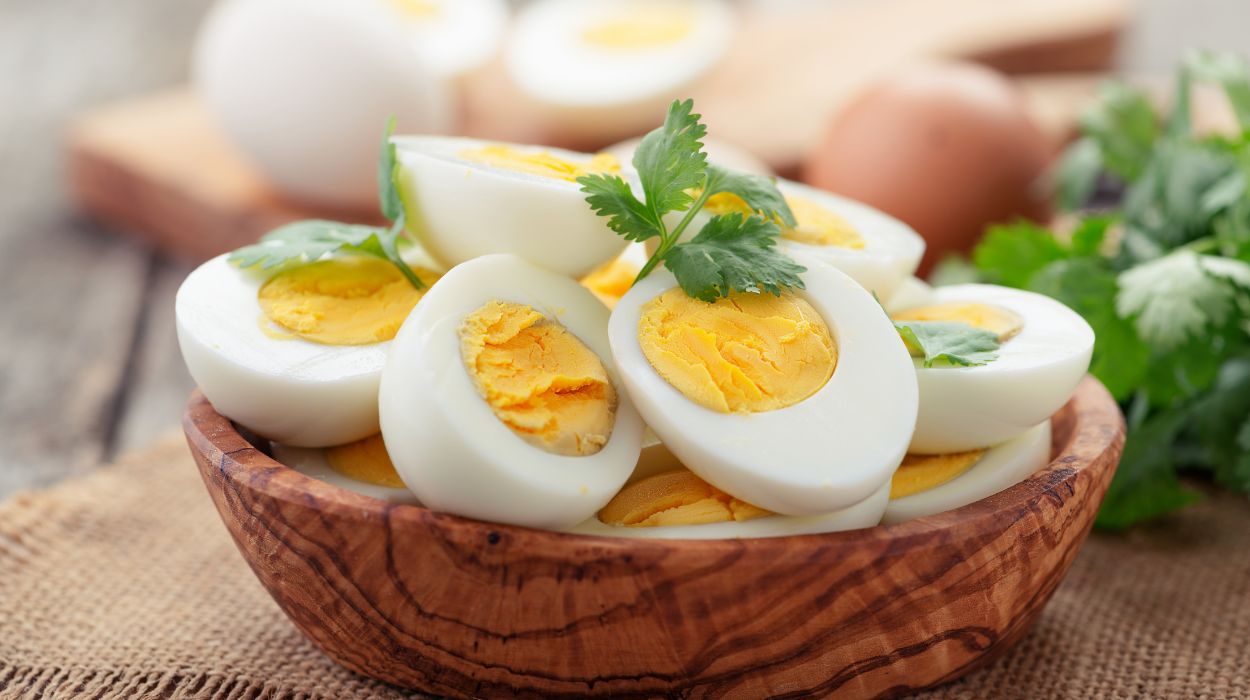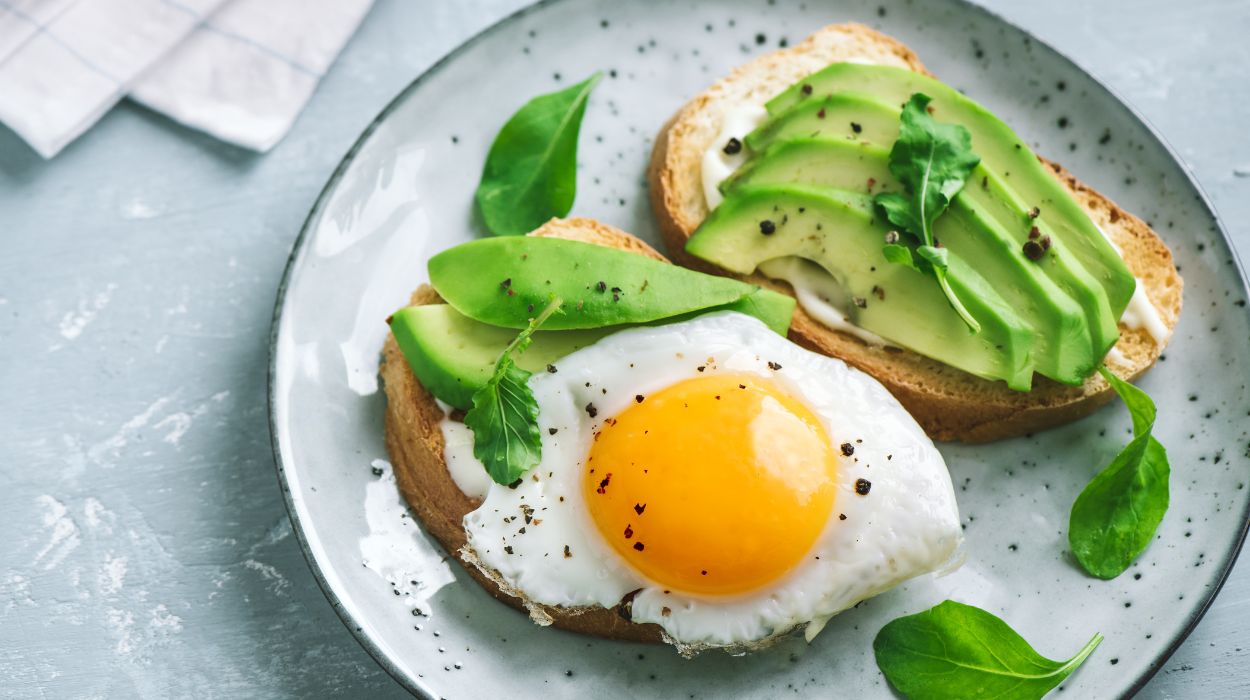 Expert's opinion
Expert's opinion
Expert's opinion
The article is a subjective view on this topic written by writers specializing in medical writing.
It may reflect on a personal journey surrounding struggles with an illness or medical condition, involve product comparisons, diet considerations, or other health-related opinions.
Although the view is entirely that of the writer, it is based on academic experiences and scientific research they have conducted; it is fact-checked by a team of degreed medical experts, and validated by sources attached to the article.
The numbers in parenthesis (1,2,3) will take you to clickable links to related scientific papers.
How Many Eggs Per Day Can Someone Eat On Keto Diet 2024?

Changing your diet to lose weight can be tricky! Ditching some of your favorite foods and swapping new options is typically part of the deal.
In the keto diet, a low-carb diet, one of the most popular foods dieters consume is eggs. Eggs are ideal for the keto diet due to their high protein and fat content.
You might be thinking: are eggs good for you? How many eggs per day can someone eat on a keto diet? What are the benefits of eating eggs? Are there any side effects?
In this article, we will explore all of the answers to your questions and learn exactly what makes the egg so egg-mazing!
How Many Eggs Can You Eat A Day On Keto Diet?
You might be wondering, how many eggs a day can someone have on the keto diet? Technically, you can eat as many eggs as you want! Egg whites and egg yolks are great for weight loss. You can have eggs at every meal as long as you stay within your nutritional requirements. Eggs contain both good fats and protein and virtually no carbohydrates, essential elements of the keto diet.
Eggs’ Nutritional Information
Eggs are a nutritionally dense food. On the keto diet, eggs make a great high-protein breakfast for weight loss. They are perfect to incorporate into any diet. Eggs are a source of protein, healthy fat, calcium, sodium, potassium, vitamins and minerals. According to the USDA,[1] one large raw, whole, fresh egg contains the following nutrients:
- Calories 71.5
- Protein 6.3 g
- Total lipid (fat) 4.76 g
- Calcium 28 mg
- Magnesium, Mg 6 mg
- Phosphorus, P 99 mg
- Potassium, K 69 mg
- Sodium Na, 71 mg
- Selenium, Se 15.4 µg
- Folate, total 23.5 µg
- Vitamin A 270 IU
- Vitamin D (D2 + D3) 41 IU
- Fatty acids, total saturated fat 1.56 g
You can find a complete list of the full egg nutrition information here.[1]
Are There Carbs In Eggs?

Eggs are the highest in fat and protein. However, they contain a small amount of carbohydrates, but not enough to knock you out of ketosis. On the ketogenic diet[2] less than 10% of your total daily calories can come from carbohydrates. This recommendation ensures your body remains in ketosis. An average person on a ketogenic diet eats around 1500-2000 calories daily. This means you should have no more than 150-200 calories from carbohydrates in a day.
One large egg, approximately 50 g, contains 0.36 g of carbohydrates. If you had ten eggs daily, you would consume less than 4 g of carbohydrates. Consuming ten eggs will equal 16 calories from carbohydrates if we convert carbohydrates to calories. That is way less than the required cut-off for the keto diet. This is why eggs are one of the most popular foods on the keto diet plan.
Health Benefits Of Eggs On Keto
May Lower The Risk Of Heart Disease And Stroke
You heard that right! Studies have shown that eating an egg a day may result in a significantly reduced risk of stroke.[3] This reduced risk is a significant benefit of egg consumption that can potentially lead to a longer, healthier life.
In the past, there has been some controversy regarding the cardiovascular safety profile of egg yolk.[4] Consuming egg whites may be best for those looking to avoid raising their dietary cholesterol and any potential harm of egg yolk. If separating eggs might seem like too much work, the best egg white protein powder can be used for the keto dieter on the go.
Great Source Of Amino Acids
Egg protein is highly digestible and a source of essential amino acids.[5] Amino acids[6] are the building blocks for proteins in the body, which are needed for strong, healthy hair, nails, and skin. Consuming eggs is a great way to maintain the correct balance of amino acids in the body.
Enhancing Muscle
Egg proteins have been shown to help increase muscle synthesis in the body. Studies have shown that having more skeletal muscle manages insulin resistance, which may decrease your risk for diabetes.
The human body also uses more calories daily to maintain muscle than fat, even at rest. This means more muscle mass equals more calories burned a day. Increased muscle mass can help with weight loss and allow you to reach your goals faster!
Keto Egg Recipes

Below are some keto-friendly foods to enjoy while on the keto diet. Eggs are the main ingredient in most of the following recipes.
Egg Muffin
Keto egg muffins are one of the most popular breakfast items in the keto diet. This is because they are easy to make, quick to eat, freezer-friendly, and customizable. Oh, and we forgot to mention they are delicious!
What you will need:
- Eggs
- Diced ham
- Salt and pepper
- Onion powder
- Garlic powder
- Cayenne
- Cheddar cheese (shredded)
- Muffin tin
Steps:
- Preheat the oven to 375 F or 190 C.
- Grease the muffin tin with butter or non-stick spray.
- Crack the eggs into a large bowl.
- Add spices to your liking, whisk, and continue.
- Place cheddar cheese and ham into the muffin tin.
- Fill each cup with your egg mixture all the way to the top.
- Once filled slightly, stir the cups with a fork to ensure everything is mixed.
- Bake for 20-25 minutes.
- Remove from the oven and let it cool.
They can be stored in the fridge for an easy weekday breakfast or frozen in the freezer for up to three months. It is easy to swap out different ingredients to customize them to your liking.
Keto Breakfast Casserole
Egg casseroles are also extremely popular for the keto diet. They are easy to make and store with the perfect nutritional balance. This low-carb keto egg casserole will have you drooling!
What you will need:
- Eggs
- Salt and pepper
- Garlic powder
- Frozen spinach
- Cheddar cheese (shredded)
- Bacon (cooked)
- Casserole dish
Steps:
- Preheat the oven to 375 F or 190 C.
- Crack your eggs into a large bowl, add seasoning, and whisk.
- Take out your favorite casserole dish and grease it with butter or non-stick spray.
- Pour the frozen spinach into the bottom of the casserole dish.
- Layer on the eggs.
- Next, add cheddar cheese and mix it into the eggs.
- Sprinkle on cooked crumbled bacon.
- Add one more layer of cheddar cheese.
- Pop in the oven for 35 minutes.
- Let the casserole cool on the counter.
- Cut into single-size servings.
This casserole can be stored in the fridge for a week or cut into smaller servings to be frozen!
Keto Egg Salad
Keto egg salad is a quick, easy recipe to eat spread between some keto bread, on some celery, or even on its own!
What you will need:
- Eggs
- Salt and pepper
- Paprika
- Lemon
- Low-carb mayonnaise
- Chives (finely chopped)
- Dijon Mustard
Steps:
- Fill a pot with water, and add in the eggs.
- Turn it on high heat, and wait for the water to boil.
- Once the water has boiled, let the eggs cook for 8 minutes.
- Turn off the heat and let the hard-boiled eggs cool.
- Peel the cooled eggs.
- Dice the eggs.
- Add eggs and remaining ingredients to a mixing bowl.
- Stir ingredients until they are evenly dispersed.
- Eat right away or store in the fridge for 3 days.
Potential Side Effects Of Consuming Too Many Eggs
Allergies
Unfortunately, allergies to eggs[7] are widespread. Allergic reactions can begin at any point in a person’s life[8] due to changes in the immune response in the gut, so just because you’ve never reacted to eggs before doesn’t necessarily mean you’re safe.
Eating a high quantity of eggs for a long time can uncover an allergic issue. Symptoms include skin rash, itching, runny nose, or hives. If you start experiencing any of these symptoms, it’s essential to stop egg intake and check in with your doctor.
Excess Of Protein
Although protein is an essential part of the ketogenic diet, eating too much protein can bump your body out of ketosis and cause nutritional deficiencies. Once you’re out of ketosis, losing weight will be much more challenging. Besides, people who eat eggs with bacon and foods high in trans fats would most likely increase high blood cholesterol levels.
Too much protein in the diet can also lead to health problems[9] such as kidney stones, increased risk of fractures, and liver problems. If you experience health issues while on the keto diet, check in with your doctor.
Digestive Complaints
Eggs can wreak havoc on the digestive system if you have a food intolerance.[10] Food intolerances differ from allergies because they occur when someone can’t digest certain parts of the food and typically occur hours after eating it. People don’t always realize eggs are causing the symptoms because they happen much later.
Food intolerances can lead to bloating, gas, vomiting, abdominal pain, or diarrhea. If you experience these side effects, it is best to stop eating eggs and reevaluate your healthy diet with a nutritionist or doctor.
Conclusion
Eggs are an essential part of the keto lifestyle. They are packed with protein and healthy fats. If you are planning your keto meal plan, there is no doubt eggs will be a necessary component. The number of eggs someone on the keto diet eats daily will vary from person to person.
Eggs can be great for your health when added to any diet. They have potential health benefits for cardiovascular health, muscle mass, and hair and nail strength.
As with all diets, there are some possible risks and side effects. Especially if you are consuming a particularly restrictive egg-only diet. Before implementing any drastic diet changes, discussing your specific diet needs with your doctor is best.
+ 10 sources
Health Canal avoids using tertiary references. We have strict sourcing guidelines and rely on peer-reviewed studies, academic researches from medical associations and institutions. To ensure the accuracy of articles in Health Canal, you can read more about the editorial process here
- Usda.gov. (2023). FoodData Central. [online] Available at: https://fdc.nal.usda.gov/fdc-app.html#/food-details/171287/nutrients
- Masood, W., Pavan Annamaraju and Uppaluri, K.R. (2022). Ketogenic Diet. [online] Nih.gov. Available at: https://www.ncbi.nlm.nih.gov/books/NBK499830/
- Alexander, D.D., Miller, P., Vargas, A.J., Weed, D.L. and Cohen, S.S. (2016). Meta-analysis of Egg Consumption and Risk of Coronary Heart Disease and Stroke. Journal of The American College of Nutrition, [online] 35(8), pp.704–716. doi:https://doi.org/10.1080/07315724.2016.1152928.
- J. David Spence, Korbua Srichaikul and David J.A. Jenkins (2021). Cardiovascular Harm From Egg Yolk and Meat: More Than Just Cholesterol and Saturated Fat. [online] 10(7). doi:https://doi.org/10.1161/jaha.120.017066.
- Puglisi, M.J. and Maria Luz Fernandez (2022). The Health Benefits of Egg Protein. [online] 14(14), pp.2904–2904. doi:https://doi.org/10.3390/nu14142904.
- Rose, A.J. (2019). Amino Acid Nutrition and Metabolism in Health and Disease. [online] 11(11), pp.2623–2623. doi:https://doi.org/10.3390/nu11112623.
- Dulashi Withanage Dona and Cenk Suphioglu (2020). Egg Allergy: Diagnosis and Immunotherapy. [online] 21(14), pp.5010–5010. doi:https://doi.org/10.3390/ijms21145010.
- Massimo De Martinis, Maria Maddalena Sirufo and Ginaldi, L. (2017). Allergy and Aging: An Old/New Emerging Health Issue. [online] 8(2), pp.162–162. doi:https://doi.org/10.14336/ad.2016.0831.
- Ioannis Delimaris (2013). Adverse Effects Associated with Protein Intake above the Recommended Dietary Allowance for Adults. [online] 2013, pp.1–6. doi:https://doi.org/10.5402/2013/126929.
- Nih.gov. (2020). Food allergies: Diagnosis and treatment. [online] Available at: https://www.ncbi.nlm.nih.gov/books/NBK447115/



